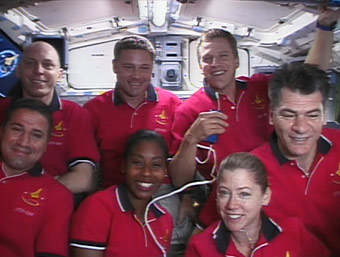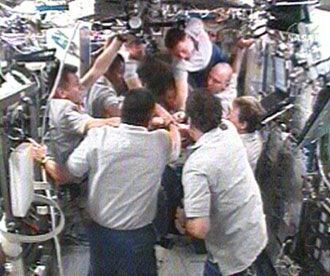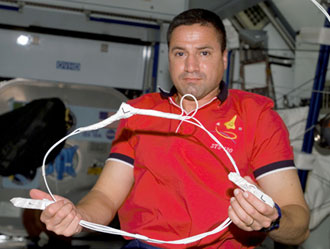 STS-120
STS-120
Report #30
Tuesday, Nov. 6, 2007 – 3 p.m. CST
Mission Control Center, Houston, Texas
HOUSTON – The seven astronauts on board space shuttle Discovery completed final preparations today for their return home with landing planned for the first of two opportunities to the Kennedy Space Center in Florida, at 12:02 p.m. Wednesday.
In preparation for the return home, the crew tested flight control systems and thruster jets, stowed equipment and installed a special reclining seat for Clay Anderson, who is returning after more than five months on board the International Space Station. Later, the crew oversaw an orbit adjust maneuver to optimize landing opportunities with weather forecasts indicating favorable conditions for Wednesday’s landing.
Early Wednesday morning, Entry Team Flight Director Bryan Lunney and his team will oversee Discovery’s reentry and landing with the deorbit burn set for 10:59 a.m. The 1 minute, 58 second burn will slow Discovery by 148 miles per hour (217 feet per second) for the reentry across the heartland of the United States traveling from the northwest to southeast.
A second landing opportunity also is available about 90 minutes later. Lunney will consider Florida only for Wednesday’s landing attempts with plenty of consumables on board to stay in space through Saturday, if necessary.
After its final on-orbit wakeup call from Mission Control at 1:38 a.m. Wednesday, the crew will begin landing preparations at 7:03 a.m. and close Discovery’s payload bay doors at 11:42 a.m. for reentry.
Aboard the space station, Commander Peggy Whitson, and Flight Engineers Yuri Malenchenko and Dan Tani had some off duty time before their full-court press toward Friday’s spacewalk by Whitson and Malenchenko to prepare Pressurized Mating Adapter 2 for its relocation Nov. 12.
The next STS-120 status report will be issued Wednesday morning or earlier if events warrant.
Important Reminder: All Times are CST! Add 1 hour for EST!



